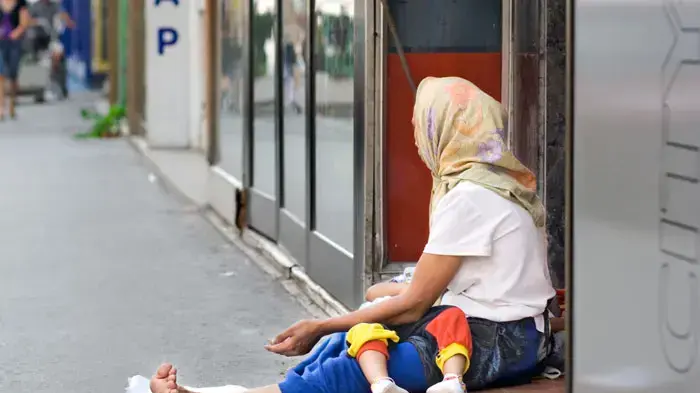"My husband was set on fire and I feel like I'm burning in oil."
This is how the Nepalese Bipana explained how her husband died after long days of construction work at extremely high temperatures in Qatar and the rage she felt for a tragedy that she could have avoided.
Tal Bahadur Gharti died in 2020, according to the emirate, "from cardiorespiratory failure due to natural causes."
He was 34 years old.
Amnesty International documented his case in a report entitled
In the prime of his life.
Qatar's failure to investigate, remedy and prevent migrant worker deaths
.
Human Rights Watch (HRW) has also accompanied the return journey in the coffin of the World Cup's weakest link: those who made it possible by building stadiums and hotels, building a new subway or expanding the airport.
Kripal Mandal, Nepali, married and father of five children, died last February.
The Qatari death certificate says he had a heart attack.
He was 40 years old.
Mohammad Kaochar Khan, from Bangladesh, married and father of one child, was found dead in his bed in November 2017;
official cause of death: “respiratory failure due to natural causes”.
He was 34 years old.
Yam Bahadur Rana, married and father of two children, died in February 2020 from another “cardiorespiratory failure due to natural causes”.
He was 34 years old.
All had passed a medical examination before starting work in Qatar.
All were exposed to extremely high temperatures.
None of them underwent an autopsy.
And since the authorities consider that they died "of natural causes", none of their families have received compensation.
HRW recently accompanied a driver carrying out a hat task: delivering the body of a migrant worker who died in Qatar to his loved ones.
FIFA and Qatar should provide remedy for serious abuses against migrant workers ahead of the 2022 World Cup: https://t.co/mD28gXyOpt pic.twitter.com/B8bYL6jOIb
— Human Rights Watch (@hrw) July 11, 2022
The soccer World Cup was held for the first time in November and December and not in summer because it was dangerous to subject players and fans to the inhumane temperatures that Qatar reaches between June and September: up to 50 degrees with 90% humidity.
But for years no one thought that it was also necessary to protect from the heat the tens of thousands of workers who were going to build the necessary infrastructure so that a territory the size of the Murcia region and 2.7 million inhabitants could accommodate another million and a half. more during the tournament.
After insisting for months that three people directly linked to the construction of the new stadiums had died and another 37 not directly related to the work on the works, Hassan Al Thawadi, general secretary of the World Cup organizing committee,
On November 29, he admitted a much higher figure: "between 400 and 500", which he later tried to qualify again.
For human rights organizations that have been denouncing the conditions of these workers for more than a decade, that number is still far from reality.
"According to Qatar's own statistics," explains Michael Page, HRW Middle East director, "there are thousands of natural deaths of perfectly healthy young people when they arrived, that is, thousands of unexplained deaths."
A coffin containing the body of a deceased Qatari Nepali worker is being moved into Kathmandu in June 2020. NurPhoto (NurPhoto via Getty Images)
The heat kills.
The WHO has warned it in successive reports on global warming: it causes heart attacks and organ failure up to days after exposure.
The International Labor Organization (ILO), a tripartite UN agency that brings together governments, employers and workers from 187 member states, published a study in November 2021 that, after analyzing Qatar's official statistics between 2016 and 2018, warned that work-related deaths in the emirate may not be classified as such.
Autopsies were not performed and in cases of hyperthermia the analysis should always be "at the scene of the incident" and taking into account the circumstances, which was never done.
'Could have been prevented'
In 2013, after detecting a striking increase in deaths on construction sites in Qatar – eight times higher than the average for other rich countries – the International Trade Union Confederation already warned that 4,000 workers could lose their lives in the next seven years if they are not urgent measures were taken to protect them.
In 2019, a study conducted by experts from medical institutes and organizations in Norway, Nepal, Australia and Cyprus examined the increase in deaths of Nepali workers in Qatar between 2009 and 2017 and concluded that at least 200 of the 571 were attributed to cardiovascular disease in young people. between 25 and 35 years old were due to exposure to extreme heat and "could have been avoided with adequate protection."
The World Cup was getting closer, this type of report proliferated and the Qatari organizing committee of the tournament,
in collaboration with ILO, commissioned a study on the impact of heat on workers.
It was published in October 2019, that is, almost nine years after the works began, and it was at that time that the emirate extended the ban on working outdoors from 10 a.m. to 3:30 p.m. from June 1. to September 15.
"They did it very late," explains HRW's Michael Page.
“By then the main constructions for the World Cup were already finished.
Many deaths could have been avoided, as well as serious consequences.
And the authorities have not investigated them for two reasons: they made Qatar and FIFA look bad and they would force employers to pay compensation to families.
In 2018 – almost eight years after obtaining the venue for the 2022 World Cup – the emirate established a fund to compensate workers in the event of death, accident or non-payment of their wages.
The organizing committee of the tournament assures that this year 331 million euros have been allocated to said fund, but families of the deceased have not received any compensation because the majority of deaths have been registered as natural.
Max Tuñón, director of ILO in Qatar,
explains that this fund has been used, above all, to pay employers' debts to their workers.
“The amount, 331 million, demonstrates the magnitude of the problem, that is, of the abuses.
In the last 12 months, 34,000 complaints for non-payments were filed”.
“An open-air jail”
Just over a year after her appointment, Nepal withdrew its ambassador to Qatar, Maya Kumari Sharma, in 2013.
The Qatari authorities had complained about her because of her statements in which she described the emirate as "an open-air prison" due to the abuses suffered by her compatriots.
The current system, called
kafala
, forced migrant workers, mainly from Southeast Asia and Africa, to depend on a kind of local godfather who could effectively withhold their passports, preventing them from changing jobs or leaving the country if they wanted to. or not pay them what was agreed.
Max Tuñón exhibits the modification, in 2018, of the
kafala
, as one of the "progress" in the legislation of the emirate.
“Now workers can leave the country or change jobs without their employers' permission, and that gives them more power to negotiate and improve their working conditions,” he explains.
This is what the new law says, but Tuñón himself admits that it does not apply in all cases.
“Some threaten their employees with deportation or suing them for something if they tell them they want to go somewhere else.”
in debt
The ILO's pressure also made it possible to establish a minimum wage for the first time: 304 euros per month in one of the richest countries in the world.
Most migrant workers needed several months to start earning money because they had previously had to buy their jobs, paying a kind of fee to recruiters to secure their place among the huge demand from countries in Southeast Asia and Africa.
“All the money we had,” explains Manu Devi, 38, the widow of Kripal Mandal, “we gave to the local recruiter.”
Her husband's employer did not even pay them for the last days of work before her death.
Mohammad Kaochar Khan paid €3,915 – a fortune in Bangladesh – to ensure that he would have a job in Qatar.
“The law prohibits these practices,” explains Michael Page of Human Rights Watch,
“But the emirate does not monitor it and tens of thousands of workers had to go into debt, borrowing at very high interest to be able to go to work in Qatar.
If later, as so often happened, the employer did not pay them, the problem was further complicated.
Relatives of the deceased now find themselves without the income provided by the head of the family and with a debt to pay.
Also those who have returned alive, but with serious sequelae, such as those who require dialysis due to kidney failure caused by exposure to extreme heat, are now unable to continue working as before and forced to pay the loan and the high interest they incurred to curry favor with recruiters.
requesting loans at very high interest to be able to go to work in Qatar.
If later, as so often happened, the employer did not pay them, the problem was further complicated.
Relatives of the deceased now find themselves without the income provided by the head of the family and with a debt to pay.
Also those who have returned alive, but with serious sequelae, such as those who require dialysis due to kidney failure caused by exposure to extreme heat, are now unable to continue working as before and forced to pay the loan and the high interest they incurred to curry favor with recruiters.
requesting loans at very high interest to be able to go to work in Qatar.
If later, as so often happened, the employer did not pay them, the problem was further complicated.
Relatives of the deceased now find themselves without the income provided by the head of the family and with a debt to pay.
Also those who have returned alive, but with serious sequelae, such as those who require dialysis due to kidney failure caused by exposure to extreme heat, are now unable to continue working as before and forced to pay the loan and the high interest they incurred to curry favor with recruiters.
Relatives of the deceased now find themselves without the income provided by the head of the family and with a debt to pay.
Also those who have returned alive, but with serious sequelae, such as those who require dialysis due to kidney failure caused by exposure to extreme heat, are now unable to continue working as before and forced to pay the loan and the high interest they incurred to curry favor with recruiters.
Relatives of the deceased now find themselves without the income provided by the head of the family and with a debt to pay.
Also those who have returned alive, but with serious sequelae, such as those who require dialysis due to kidney failure caused by exposure to extreme heat, are now unable to continue working as before and forced to pay the loan and the high interest they incurred to curry favor with recruiters.
"Today I feel like an immigrant worker," FIFA president Gianni Infantino declared at the start of the World Cup, at a press conference in which, to escape criticism, he accused the West of hypocrisy: "Europe should apologize for the last 3,000 years.
The human rights organizations that have spent years denouncing the situation of the group boiled their blood.
“They have made a lot of money with the World Cup and they are disrespecting these people.
It's disgusting," says Page of HRW.
During the recent group stage, another worker died, a 40-year-old Filipino who was carrying out repairs at the resort used as a FIFA training base by the Saudi Arabian team.
The cheapest room this Saturday in the complex cost 422 euros.
Asking why it happened,
FIFA President Gianni Infantino during a press conference before the start of the World Cup on November 19 in Doha.Christopher Lee (Getty Images)
The emirate has spent 12 years trying to draw an invisible line between the works that do have to do with the World Cup and those that do not.
It is a way of reducing the number of deaths and the negative impact they cause in the great image campaign that they have launched with the tournament.
Asked about the death of the Filipino worker, a spokesman for the Qatari government assures that if it is verified that the adequate security protocols were not complied with in the hotel complex, the company for which he worked will be denounced and forced to pay "a severe economic sanction". .
He also said the accident rate had "dropped considerably" since Qatar introduced safety measures and inspections into its legislation to ensure compliance.
But when Reuters asked Nasser Al Khater, executive director of the organizing committee,
for that last deceased worker, he answered, annoyed: “We are in the middle of a World Cup.
It is being a success.
And this is what you want to talk about now?
Death is a natural part of life, whether at work or while you sleep."
The final will be played next Sunday and fans of the winning country will celebrate in style.
Meanwhile, thousands of widows like Bapina feel on fire inside.
Subscribe here
to our special newsletter about the World Cup in Qatar












